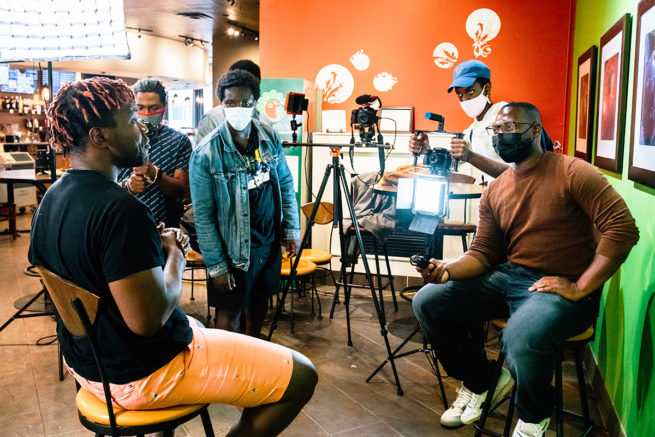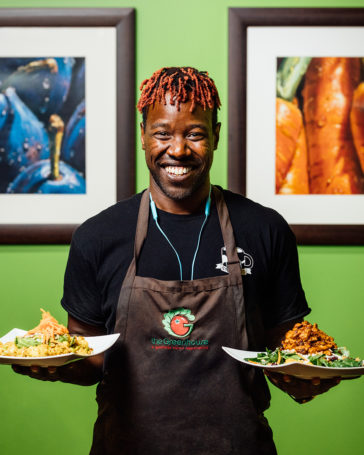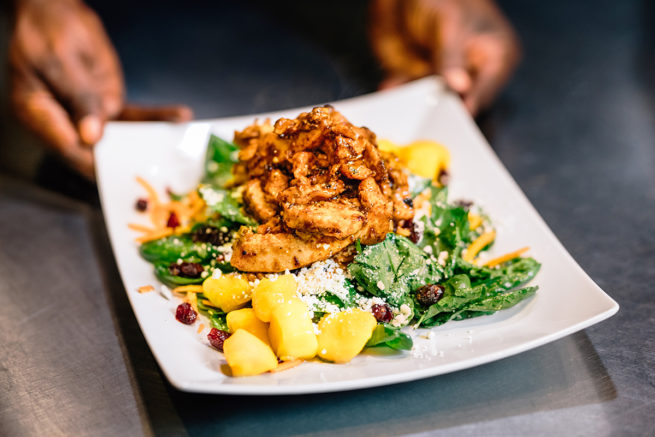September 14, 2021
YEG Eats video series puts the spotlight on local BIPOC-owned restaurants
A couple of years ago, a friend brought budding filmmaker Tomi Okunnuga to Monamie Resto, a northeast Edmonton restaurant.
“I had been in Edmonton for quite a few years and had never heard of this place,” chuckles Okunnuga, who immigrated to the city from Lagos, Nigeria in 2008. “There was Nigerian food, Caribbean, Ghanaian food; it opened my eyes as to what I could find here.”
It also prodded Okunnuga into thinking about the number of Edmonton eateries that go unnoticed next to the chain restaurants that end up being automatic destinations for many diners. While the city is known as a launching pad for such successful endeavours as Boston Pizza and Earls, smaller BIPOC restaurateurs often end up struggling to make ends meet. There have been a number of closures over the last couple of years, including Veggie Garden and Doan’s, both well-regarded Vietnamese restaurants. Like other businesses, BIPOC-owned restaurants have also struggled with the pandemic.
With that thought in mind, Okunnuga decided to film a series called YEG Eats, bringing attention to a number of the places to which he had been introduced. First, however, he and his company, Imagene Films, needed to find some funding.

“We actually didn’t qualify for anything that was available,” chuckles Okunnuga, who has been taking online film classes for some years now. “Most of the grants were for non-profits. Still, I decided to try with the Edmonton Community Foundation (ECF). They got back to us and said that we didn’t qualify for any of their usual grants, but maybe they could work something out.”
It turned out that ECF was able to come up with $8,000 for the project, enough for Okunnuga to bring in a bare-bones crew to work with him. Changing health regulations meant that they had to adjust their initial filming schedule from August 2020 to the beginning of 2021. Eight restaurants were selected: GreenHouse Health Food Eatery, Monamie Resto, Yellowhead Donair and Pizza, Koultures Afro-Continental Restaurant, Mesobena, Zuhur Restaurant, Safron’s Caribbean Delight and Tantalizers African Express.
Once regulations loosened in early 2021, Okunnuga and his crew shot interviews and behind-the-scenes footage, all the while adhering to COVID-19 guidelines. For many of the restaurants, it was the first time they were highlighted outside of their community. Mikhail Prime, proprietor and chef of GreenHouse Health Food Eatery, saw his interview as a way to correct certain presumptions about Black-owned restaurants.

“Sometimes people will come in and they’re surprised to find that the establishment is Black-run,” he explains. “Maybe because it’s so well-run, I don’t know. There’s a tendency with some people to assume that they’re a little bit more disorganized. Ethnic restaurants are where you find passion, and where you find people caring about every single thing they do.”
This was something that Okunnuga discovered during his time filming: Finding the pride of the restaurant owners reflected back at them by their loyal customers. While setting up in the morning for an interview with the proprietors of Safron’s Caribbean Delight, a customer came in requesting a favourite meal. Informed that the restaurant wasn’t open, he turned around and went back to his car, waiting for three hours before he could order.
“When the restaurant opened, he came right back in, talking about how badly he wanted his food,” Okunnuga marvels. “He was willing to wait as long as it took.” It was a story that Okunnuga found over and over again, and one that indicates hope for all of us in the long-term. Whenever the filmmaker gently prodded for instances of racism, the owners invariably offered something else — people of different ethnicities eating together in peace.
“They would tell me that there’s an openness about trying other people’s food and finding out about other cultures,” he says. “We will keep eating your food because it’s delicious.”

Moving efficiently, Okunnuga was able to film the segments in a matter of months, at the same time bonding with his subjects as entrepreneurs of colour, the filmmaker’s quest in some ways mirroring his subjects. While Okunnuga is quick to point out that his videos will mostly show the positive aspects of being in the restaurant business, race invariably becomes part of the equation.
“You have to be twice as good,” Prime reflects. “The film business is about who you know and getting involved with the right people, and some of the opportunities that may come down to people of Caucasian descent may not come your way. So we help each other out. Not only are they helping me out by creating media for me, I’m trying to help them out with some of my contacts.”
As of this writing, the filming is over and the team is moving into the final stages of editing. After the initial series is finished, the plan is to develop the concept further. It’s a calling-card for Okunnuga and Imagene Films, but it’s also his baby. In the meantime, he’s making use of his deep knowledge of restaurants in Edmonton.
“Yesterday I drove 30 minutes out of my way to get something from Safron’s Caribbean Delight,” he chuckles. “I live in the west end and they’re just off downtown. But like the guy who was waiting in his car, I’ll go anywhere for good food.”
The YEG Eats team releases two episodes every week. You can view them at the official YEG Eats Youtube channel.